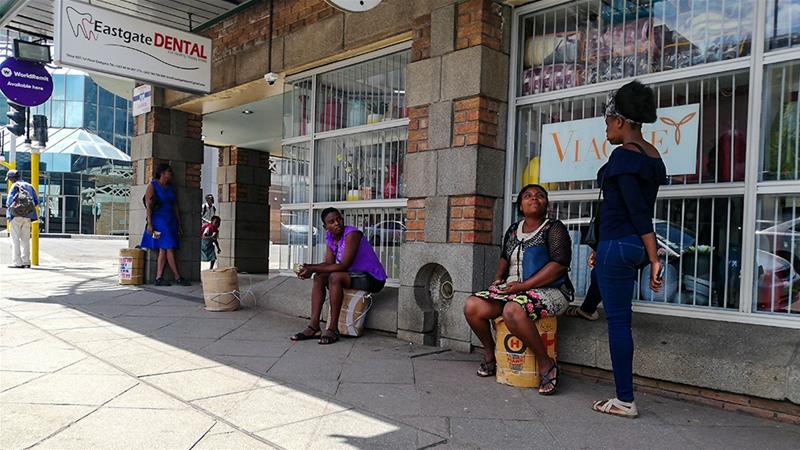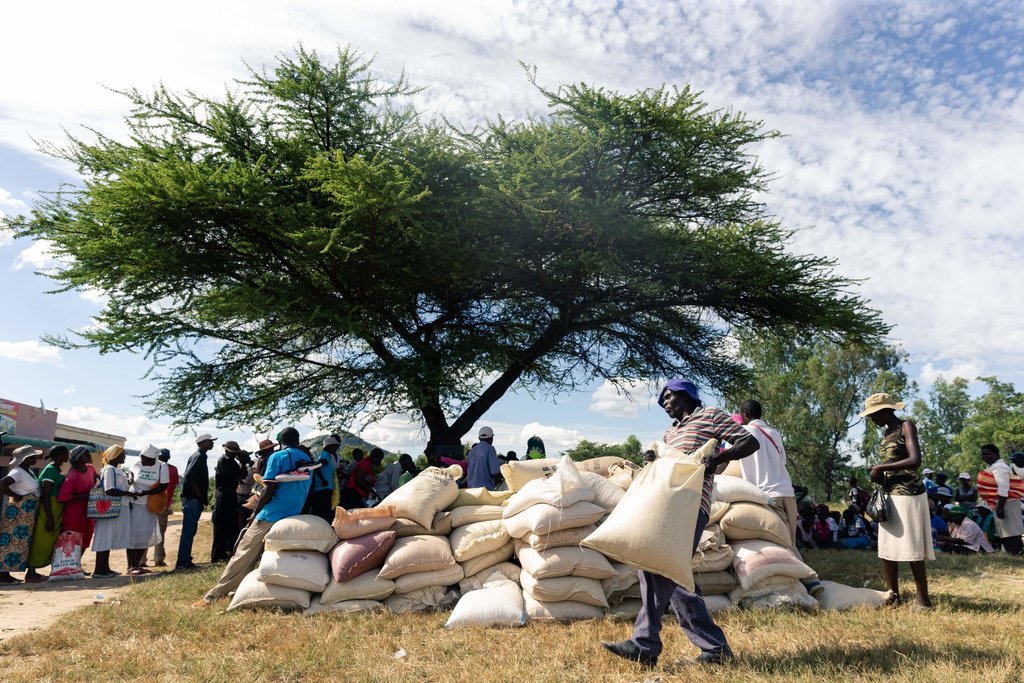Illegal money traders who used to flood the streets of Harare and Mutare are now working from home while Zimbabwe is under lockdown to curb the spread of coronavirus [File: Farai Matiashe/Al Jazeera]
Harare, Zimbabwe – In the densely-packed Harare suburb of Kambuzuma, in the midst of a nationwide lockdown, 25-year-old Philip Mundozo is hard at work, servicing customers who want to buy and sell the currency of choice in Zimbabwe – United States dollars.
“I cannot go to town, but that has not stopped me from doing my work. Customers call me and come to my house to trade,” Mundozo told Al Jazeera by phone.
Before President Emmerson Mnangagwa ordered a 21-day lockdown in late March to curb the spread of COVID-19, Mundozo’s place of business was a bus terminal – popularly known as Copa Cabana – in the central business district in Harare.
But COVID-19 containment measures have only slightly dented demand for money-changing.
Zimbabwe has confirmed 18 cases of COVID-19, and three deaths from the disease. But a deep economic crisis has ravaged the troubled southern African nation’s healthcare system.
Medics, opposition politicians and activists have warned about a woefully insufficient number of testing kits. When people do fall ill – with any ailment – they often struggle to find professional care.
Mundozo is very aware of the health risks involved in his customer-facing corner of Zimbabwe’s informal economy, where he and many of the country’s youths carve out a living as money-changers.
“I just make sure that when they [customers] come I observe social distancing [because] in as much as I need money to sustain my family, I don’t want to get infected or to infect them,” he said.
Supply and demand
Money-changers like Mundozo charge fees for “cash-in, cash-out services” that allow customers on the country’s mobile EcoCash platform to convert electronic balances in their mobile money wallets into hard currency, and vice versa.
Their services are actively sought.
In Zimbabwe, buying something with electronic balances can invite a markup as high as 50 percent because supplies of hard cash – both Zimbabwean dollar notes and US dollars – are in chronically short supply due top to hyperinflation.
Last year, the government outlawed the use of US dollars in local transactions in a bid to stem speculative attacks on an interim currency that eventually paved the way for a new sovereign Zimbabwean dollar – or Zimdollar – that was introduced in November.
But the Zimdollar continued to rapidly lose value. In February, annualised inflation blew past 500 percent. And the pandemic has only boosted demand for US dollars.
Last month, after cases of COVID-19 infections were formally confirmed within Zimbabwe’s borders, the country’s central bank lifted restrictions on US dollars in local transactions to make “it easier for the transacting public to conduct business during this difficult period”.
Trish Katete, 30, is a money-changer who operates in Chikanga, a packed suburb of Mutare, the country’s fourth-largest city.
Like Mundozo, she told Al Jazeera she is continuing to ply her trade from her home through the lockdown because she simply cannot afford not to work and because customers are calling her.
“Each day I make a profit of 150 Zimdollars [$5],” she said by telephone. “I am able to pay fees for my children and to give them food.”
A brief respite for a troubled currency
As in other countries around the globe, business in Zimbabwe has inevitably slowed as COVID-19 containment measures have shuttered businesses, closed borders and sent consumers behind closed doors.
The deceleration in commerce, combined with a green light for US dollars in local transactions, has taken some of the relentless pressure off the Zimbabwean dollar.
It currently takes 25 Zimbabwean dollars to buy $1 at interbank exchange rates. On the parallel markets, the exchange rate has fallen back to 40 Zimdollars to $1, from 45 Zimdollars.
But economists say the respite for the beleaguered Zimdollar is likely only temporary.
The country’s hyperinflationary crisis has been exacerbated by drought that has left millions of people food insecure and contributed to a chronic power shortage characterised by daily blackouts.
Then there are problems that are entirely man-made.
In 2009, the country’s sovereign currency had to be abandoned altogether after years of poor policy decisions gutted agricultural exports, decimated manufacturing and saw the central bank print vast quantities of sovereign notes to finance deficit spending.
“Exchange rates are a function of money supply,” independent economist Eddie Cross told Al Jazeera. “In our case, the Reserve Bank [of Zimbabwe] has in the past printed money on a large scale to meet a state deficit, and this has destroyed the local currency.”
That legacy, says Cross, is still fresh in the mind of speculators who seek every opportunity to profit from eroding faith in Zimbabwe’s new sovereign currency.
“The traders have been able to manipulate the situation in their favour. They drive the rate down and make millions on every turn,” he said. “This has weakened the local currency, and we are now engaged in a struggle to regain lost ground.”
There are also severe structural issues working against Zimbabwe’s currency. The country has few functioning industries and relies on imports for nearly everything from food and furniture to building materials and even toothpicks.
Economist John Robertson of Robertson Economics says without export strength to bring in sufficient foreign exchange reserves, the local currency will continue to be vulnerable.
“So its value is falling and everybody would prefer to deal in US dollars,” he told Al Jazeera.
Now the coronavirus pandemic is closing borders, posing additional challenges to this heavily import-dependent nation.
“South Africa [SA] being the most affected in southern Africa, there is going to be an impact on trade between SA and Zimbabwe,” economist Persistence Gwanyanya told Al Jazeera. “[The movement of] goods from SA will be affected.”
And while that is bad news for Zimbabwe’s currency and economy, for informal money-changers like Muzodo, it means their services will likely remain in strong demand.
“I am confident the USD will [continue] trading higher than the official rate,” he said.










 Kathryn Rubino is a Senior Editor at Above the Law, and host of
Kathryn Rubino is a Senior Editor at Above the Law, and host of 







